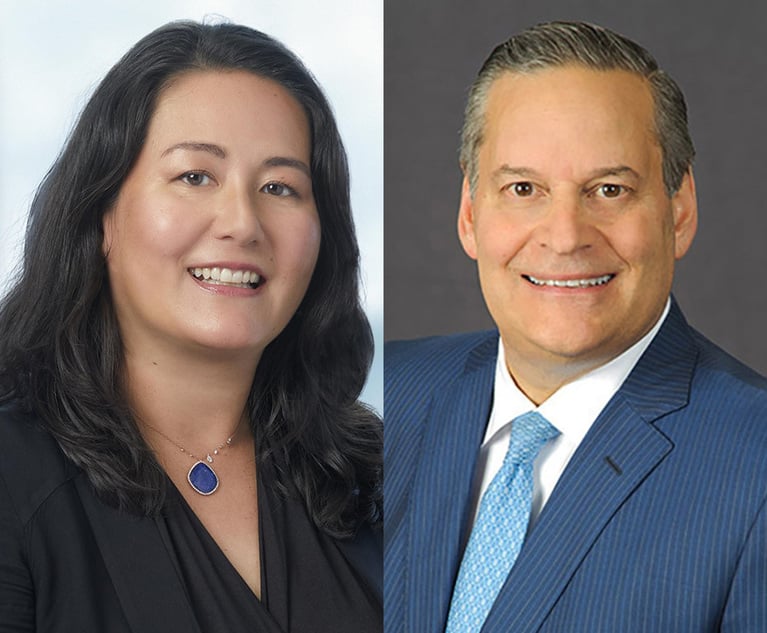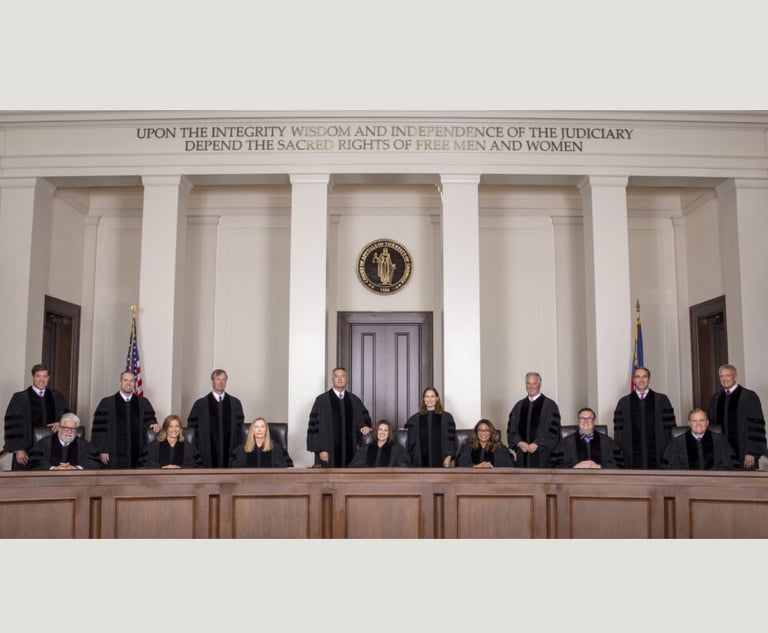 Signage on the outside of the Atlanta Financial Center, Buckhead. (Photo: John Disney/ALM)
Signage on the outside of the Atlanta Financial Center, Buckhead. (Photo: John Disney/ALM)Morris Manning Promotes Another Record-Size Class
"The middle sometimes gets forgotten when people talk about growth," said Simon Malko, the firm's managing partner. That includes senior associates and new partners, he said.
October 16, 2019 at 04:17 PM
4 minute read
Morris Manning & Martin, the first big Atlanta-based firm to announce its new partner class, has again promoted a large number of lawyers relative to its size, as part of its focus on organic growth.
The 200-lawyer firm has made eight new partners, effective Jan. 1, 2020, tying with last year's record-size class.
Managing partner Simon Malko said the class size is large partly because the firm has made "sustained, organic" growth a top priority, rather than expanding through acquisitions and mergers. Morris Manning does not have a two-tiered partnership track, he said, so associates who make partner are equity partners.
The firm currently has 82 partners, which means the eight partner promotions will expand the partnership ranks by 10% when they take effect in January.
 Simon Malko, Morris Manning Martin, Atlanta. (Courtesy photo)
Simon Malko, Morris Manning Martin, Atlanta. (Courtesy photo)
Like other firms, Morris Manning focuses on "hiring really good people out of law school and bringing in the right lateral partners," Malko said. "But the middle sometimes gets forgotten when people talk about growth."
Morris Manning wants to retain and promote promising lawyers, including senior associates, in the middle of developing their careers, he said—a cadre that can get overlooked amid the ever-alluring promise of lateral partner recruitment.
For sustained growth, "the middle is really important," he said. "If you can't retain the people you're bringing in, and a firm is a revolving door, it's hard to grow."
Malko said he hopes the relatively large number of promotions signals to associates who have not yet made partner that they have a bright future at Morris Manning.
"We are not an up-and-out firm," he said, adding that this year's new partner class is a mix of homegrown talent and newer, lateral associates.
"There are many paths to partnership. Whether attorneys have been here their entire careers or came from other firms where they did not feel valued, Morris Manning will recognize and reward hard work and talent," Malko said.
Associates are eligible for partnership consideration after eight years of practice, and they are not required to have their own book of clients, he added. "A lot of them are involved in core, well-established practices which need additional partners as they grow."
The new partner class includes lawyers in established practices such as commercial real estate and tax as well as newer practices in which the firm has been investing, such as cybersecurity and, in Washington, international trade and government contracts.
While this year's class is the same size as last year's, its demographics are a bit different. The majority of the promotions this year—five out of the eight—went to women. That compares with only one woman out of eight new partners in the 2019 class—and a class of four men in the year before.
What's more, Morris Manning promoted three lawyers to partner in its Washington, D.C., office, an expansion priority for the firm, compared with only one D.C. promotion last year. (The other seven were in its Atlanta headquarters.)
Malko said the sharp increase in promotions for women is a trend he hopes to continue, noting the firm earned Mansfield Rule certification for the second year in a row. That certification program, launched by Diversity Lab in 2018, means that at least 30% of participating firms' leadership and equity partner candidates must be women.
The Morris Manning lawyers promoted to partner in Atlanta are: Bess Hinson, who chairs the firm's privacy and cybersecurity group; Wyatt Kendall, who has an environmental law practice focused on brownfield redevelopment and urban renewal projects; Lee Ann Sapp, a commercial real estate lawyer; Ellenor Stone, an employment lawyer; and Pelham Wilder, also a commercial real estate lawyer.
Those in Washington are: Mary Hodgins, who is part of the firm's D.C.-based international trade group; C. Kelly Kroll, who is on its government contracts team; and Matt Wochok, who has a tax law practice.
This content has been archived. It is available through our partners, LexisNexis® and Bloomberg Law.
To view this content, please continue to their sites.
Not a Lexis Subscriber?
Subscribe Now
Not a Bloomberg Law Subscriber?
Subscribe Now
NOT FOR REPRINT
© 2025 ALM Global, LLC, All Rights Reserved. Request academic re-use from www.copyright.com. All other uses, submit a request to [email protected]. For more information visit Asset & Logo Licensing.
You Might Like
View All
Burr & Forman, Smith Gambrell & Russell Promote More to Partner This Year
7 minute read
Few Atlanta-Centric Law Firms Expected to Pay Associate Bonuses at Market Scale
5 minute read
Experts Not Foreseeing More Rules Governing Prosecutors' Actions After Georgia Court's Removal of DA From Election Case
8 minute read
Trending Stories
- 1Withers Hires Lawyers, Staff From LA Trusts and Estates Boutique
- 2To Speed Criminal Discovery, NY Bill Proposes Police-to-Prosecutor Pipeline For Records
- 3Merchan Rejects Trump's Bid to Delay Manhattan Sentencing
- 4High-Low Settlement Agreement 'Does Not Alone Establish Bias:' State High Court Affirms $20M Med Mal Verdict
- 5NYAG Preparing to Withdraw From Defense of Four Correction Officers' Federal Lawsuits
Who Got The Work
Michael G. Bongiorno, Andrew Scott Dulberg and Elizabeth E. Driscoll from Wilmer Cutler Pickering Hale and Dorr have stepped in to represent Symbotic Inc., an A.I.-enabled technology platform that focuses on increasing supply chain efficiency, and other defendants in a pending shareholder derivative lawsuit. The case, filed Oct. 2 in Massachusetts District Court by the Brown Law Firm on behalf of Stephen Austen, accuses certain officers and directors of misleading investors in regard to Symbotic's potential for margin growth by failing to disclose that the company was not equipped to timely deploy its systems or manage expenses through project delays. The case, assigned to U.S. District Judge Nathaniel M. Gorton, is 1:24-cv-12522, Austen v. Cohen et al.
Who Got The Work
Edmund Polubinski and Marie Killmond of Davis Polk & Wardwell have entered appearances for data platform software development company MongoDB and other defendants in a pending shareholder derivative lawsuit. The action, filed Oct. 7 in New York Southern District Court by the Brown Law Firm, accuses the company's directors and/or officers of falsely expressing confidence in the company’s restructuring of its sales incentive plan and downplaying the severity of decreases in its upfront commitments. The case is 1:24-cv-07594, Roy v. Ittycheria et al.
Who Got The Work
Amy O. Bruchs and Kurt F. Ellison of Michael Best & Friedrich have entered appearances for Epic Systems Corp. in a pending employment discrimination lawsuit. The suit was filed Sept. 7 in Wisconsin Western District Court by Levine Eisberner LLC and Siri & Glimstad on behalf of a project manager who claims that he was wrongfully terminated after applying for a religious exemption to the defendant's COVID-19 vaccine mandate. The case, assigned to U.S. Magistrate Judge Anita Marie Boor, is 3:24-cv-00630, Secker, Nathan v. Epic Systems Corporation.
Who Got The Work
David X. Sullivan, Thomas J. Finn and Gregory A. Hall from McCarter & English have entered appearances for Sunrun Installation Services in a pending civil rights lawsuit. The complaint was filed Sept. 4 in Connecticut District Court by attorney Robert M. Berke on behalf of former employee George Edward Steins, who was arrested and charged with employing an unregistered home improvement salesperson. The complaint alleges that had Sunrun informed the Connecticut Department of Consumer Protection that the plaintiff's employment had ended in 2017 and that he no longer held Sunrun's home improvement contractor license, he would not have been hit with charges, which were dismissed in May 2024. The case, assigned to U.S. District Judge Jeffrey A. Meyer, is 3:24-cv-01423, Steins v. Sunrun, Inc. et al.
Who Got The Work
Greenberg Traurig shareholder Joshua L. Raskin has entered an appearance for boohoo.com UK Ltd. in a pending patent infringement lawsuit. The suit, filed Sept. 3 in Texas Eastern District Court by Rozier Hardt McDonough on behalf of Alto Dynamics, asserts five patents related to an online shopping platform. The case, assigned to U.S. District Judge Rodney Gilstrap, is 2:24-cv-00719, Alto Dynamics, LLC v. boohoo.com UK Limited.
Featured Firms
Law Offices of Gary Martin Hays & Associates, P.C.
(470) 294-1674
Law Offices of Mark E. Salomone
(857) 444-6468
Smith & Hassler
(713) 739-1250






